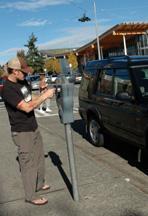Mixed feelings greet meters
Wed, 10/26/2005
Rebekah Schilperoort
The new paid parking stations that are coming to downtown Ballard could enhance turnover for local businesses, according to the Seattle Department of Transportation. But reaction from many local businesses is mixed.
The city's decision to install pay stations is based on a Downtown Ballard Parking Study conducted in May of this year, as well as findings from the last two years of parking studies conducted in other Seattle neighborhoods.
"(We) conduct parking studies to understand the parking climate in a business district and to determine how well parking regulations are working to create parking turnover so that customers and visitors can find short-term parking space," said Meghan Shepard, associate transportation planner for the Department of Transportation.
In downtown Ballard, the majority of parking spaces allow two hours of parking while some are metered, two-hour or 15 to 30-minute spots. With the conversion to pay stations, most parking will be two-hour limits for $1.50 per hour, and most of the fifteen and 30-minute spots will be converted to 30-minute pay station spaces, said Shepard.
The parking study revealed a few "hot spots" on Market Street and other nearby streets where parking regulations were not working well and where impacts from new building developments needed to be addressed, Shepard said.
"By ensuring high turnover, customers driving to a business district like Ballard are much more likely to find a parking space in a convenient location, improving their ability to shop in or visit the neighborhood," she said.
While some businesses on Market Street seemed to agree with this theory others had different opinions.
Lydia Mencias, manager for Matt's Gourmet Hot Dogs, said she believes her loyal customers will come in regardless of having to pay to park on the street.
"The parking system on Market Street now is not working," said Crystal Carlson, owner of Great Harvest Bread Co. "I'm in full support of the pay stations because I think it will benefit everybody."
Some people park in front of her shop all day costing her business, she said. The current two-hour time limit is poorly enforced, Carlson said, and she hopes the new stations will encourage people to follow parking regulations.
But management at Kitchen N' Things and La Tienda Folk Art Gallery think paid parking could be bad news for their businesses.
"I'm disappointed that they will be on Market Street," said Monique Tran, co-owner of La Tienda Folk Art Gallery. "I think it makes it harder for the customer and harder for the businesses. It will take away from the neighborhood. I'm not happy about it."
Management at Kitchen N' Things said they worry it could deter business.
"I think it will stop people from coming in," said the manager. "They'll go to the malls where they don't have to pay. It's going be the loyal Ballard folk who keep coming in but don't think for a minute you won't lose the outsiders."
The manager added that nearby condo developments could balance the potential loss of business.
Owners of Annie's Affordable Art and Cookies said there was no way to tell how customers will react or whether or not their business could suffer because of pay stations.
"If people want to come, they'll come," said the owner of Cookies.
"I come here because I don't have to pay to park," said one Ballard resident. "I would not use a meter."
Doug Scott lives in Auburn but makes frequent trips to Ballard.
"Having to pay would be a concern definitely," he said. "I guess we'll have to bring some extra cash with us. It will be kind of a hassle but we'll deal with it."
Shepard said city staff went to community meetings to seek input from Ballard business owners and residents before the decision was made. Many of the comments received were neutral or positive, but a few residents were worried that paid parking could spill over into residential neighborhoods, she said.
Pay stations have been active at the Ballard Locks parking lot since June. Even though Locks manager Dru Butterfield said visitation at the well-known tourist attraction has slipped by about 5 percent since the previous year, he doesn't believe it is because of the pay stations.
"The decrease has more to do with loss of capacity of parking spots than pay stations," he said. About 72 parking spaces were lost after the Burke Gilman Trail was completed, and a few regular visitors have stopped coming to the Locks because they don't want to pay to park, he said.
Owner of the Lockspot Caf/, Arnie Pombrinke, said his lunch business has suffered since the stations arrived.
"There's no question about it," he said. "People will just drive by if they don't see a free spot." The business has about 12 designated parking spaces and has relied heavily on the Locks lot for customer parking. But there has been no noticeable change to their evening business, he said.
Parking is free after 6 p.m. and on Sundays at the Locks lot and in downtown Ballard.
Minimum payment with a debit or credit card is $1.50 at the pay stations, but users can purchase less time by using coins. The machines do not accept dollars bills.
The conversion from metered and free one and two-hour parking spaces to mostly paid two- hour parking spots begins Nov. 14 on Northwest Market Street between 22nd and 24th Avenues Northwest. Pay stations will also be installed around the east, north and west sides of 22nd Avenue Northwest, Northwest 56th and 57th Streets and down 24th Avenue Northwest.
New two-hour time limit signs will replace one-hour limits on Northwest Leary and Northwest Russell Avenues and two-hour limits will be installed around QFC and the Ballard Commons Park site.
Since 2004, parking meters have been replaced with pay stations in downtown Seattle, Capitol Hill, First Hill and the University District.


